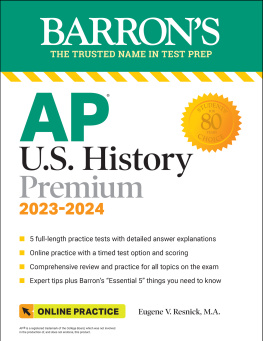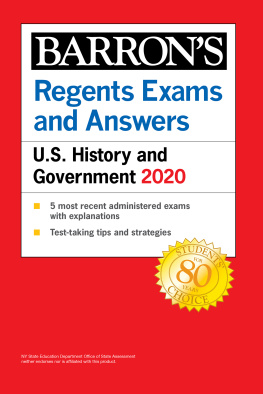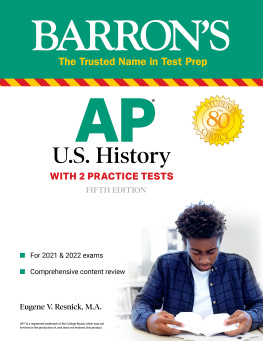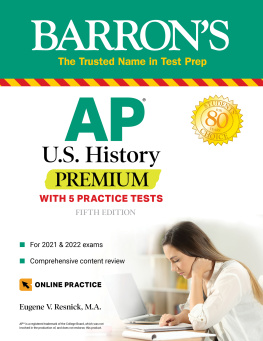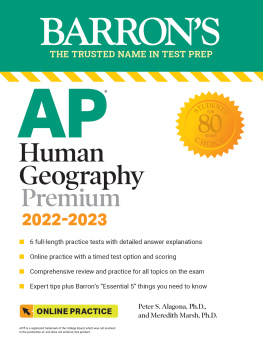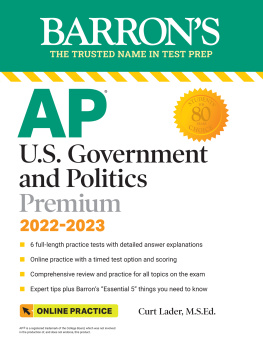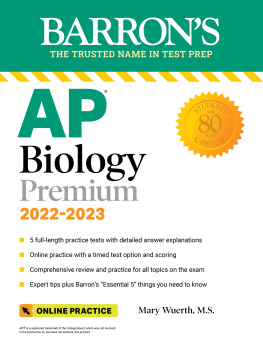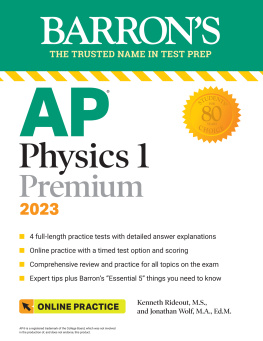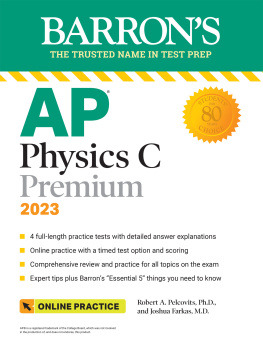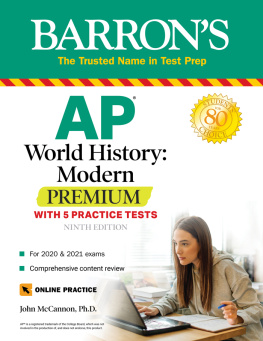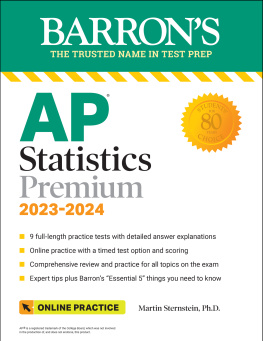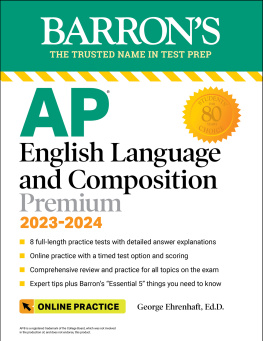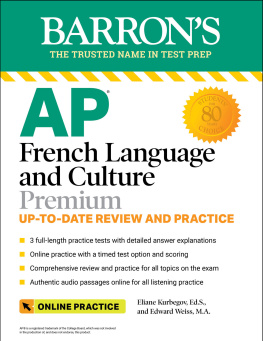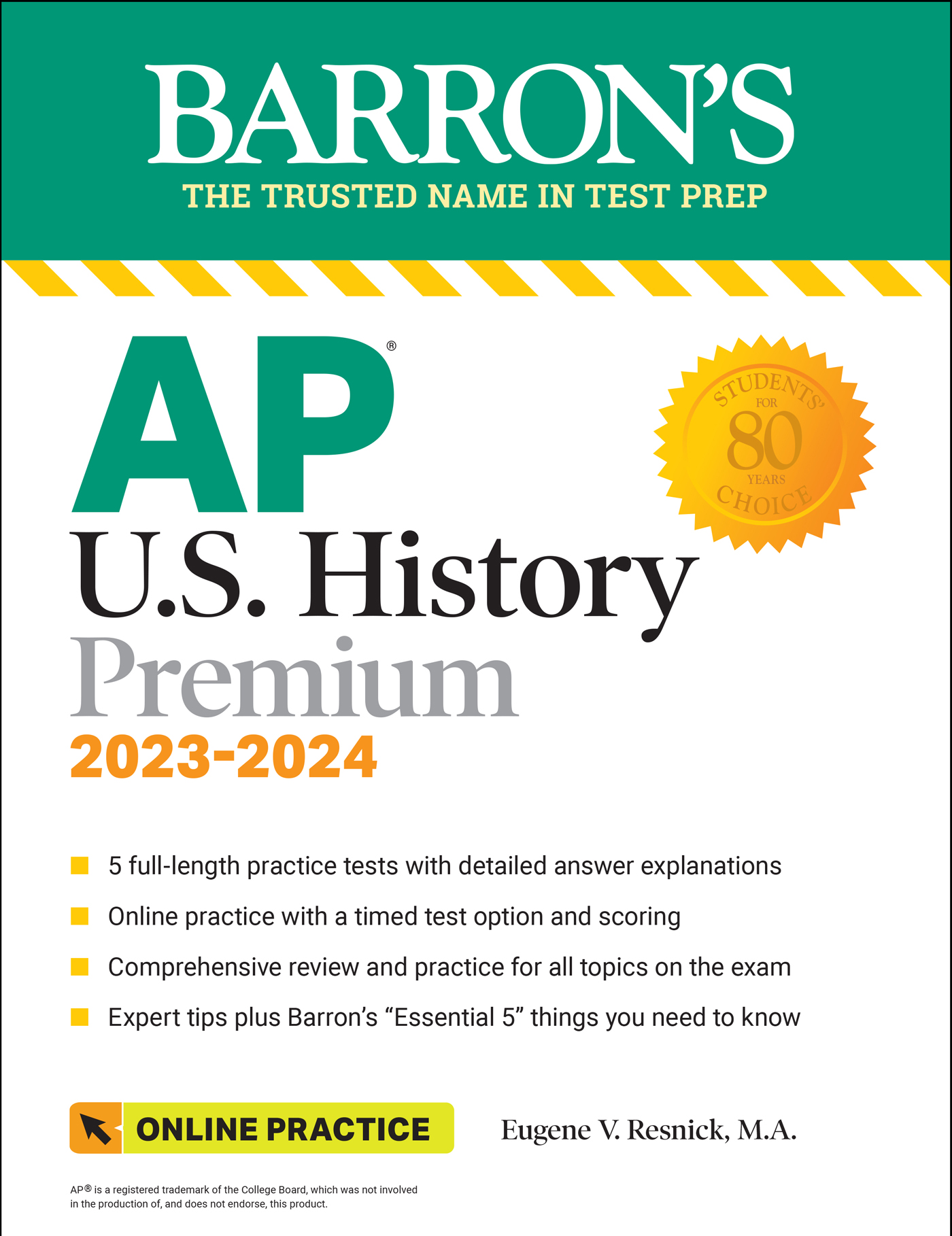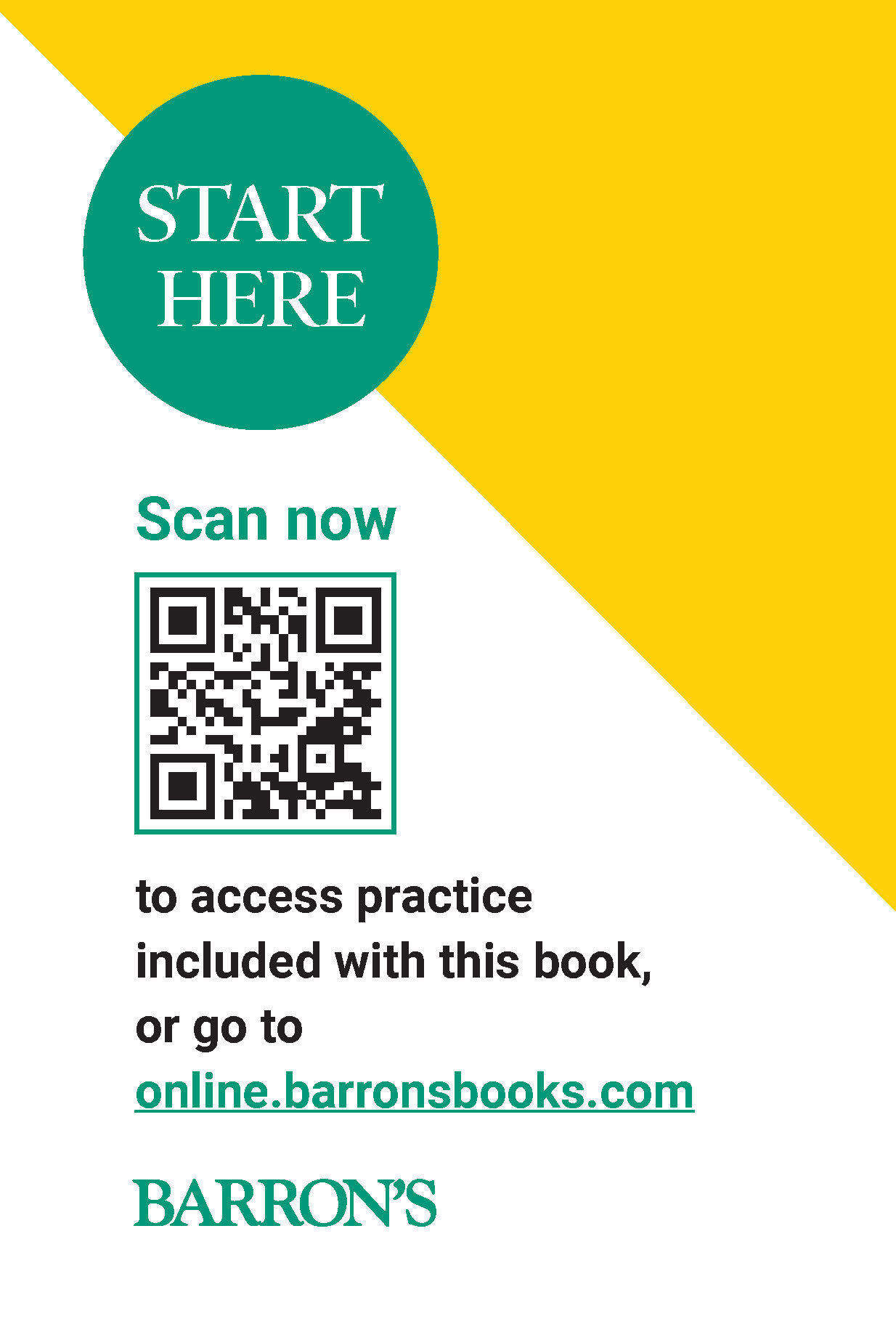

AP
United States History
Premium
2023-2024
Eugene V. Resnick, M.A.
*AP and Advanced Placement Program are registered trademarks of the College Board, which was not involved in the production of, and does not endorse, this product.
Copyright 2022, 2020, 2018, 2016, 2014, 2012 by Kaplan North America, LLC, DBA Barrons Educational Series
All rights reserved under International and Pan-American Copyright Conventions. By payment of the required fees, you have been granted the non-exclusive, non-transferable right to access and read the text of this eBook on screen. No part of this text may be reproduced, transmitted, downloaded, decompiled, reverse engineered, or stored in or introduced into any information storage and retrieval system, in any form or by any means, whether electronic or mechanical, now known or hereinafter invented, without the express written permission of the publisher.
Published by Kaplan North America, LLC, DBA Barrons Educational Series
1515 West Cypress Creek Road
Fort Lauderdale, FL 33309
www.barronseduc.com
ISBN: 978-1-5062-8117-9
10 9 8 7 6 5 4 3 2 1
Kaplan North America, LLC, DBA Barrons Educational Series print books are available at special quantity discounts to use for sales promotions, employee premiums, or educational purposes. For more information or to purchase books, please call the Simon & Schuster special sales department at 866-506-1949.
About the Author
Eugene V. Resnick has taught in the Social Studies Department at Midwood High School in Brooklyn, New York, for twenty-nine years; he has taught AP United States History for twenty-two of those years. He received a masters degree in United States history from Brooklyn College.
Acknowledgments
I would like to extend my gratitude to Sharone David for her invaluable editorial assistance and guidance, to Mark Willner, Joe Peters, and Danielle Shapiro for their assistance with this project, and to my colleagues, past and present, at Midwood High School, who have provided me with advice, feedback, and inspiration. In addition, I would like to thank the many students who have taken my Advanced Placement United States History class; I have learned much from them. Finally, many thanks to the staff at Barrons Educational Series. I am deeply indebted to Stuart Murray and John Evans for their excellent copyediting work, and to the outstanding editorial work of Peter Mavrikis, Kristen Girardi, Christine Ricketts , and Lauren Manoy. I would like to also thank the anonymous reviewers who have commented insightfully on this manuscript over the years. This book is dedicated to Aviv David-Parisa bright young scholar who never ceases to amaze me.
How to Use This Book
Review and Practice
This books review chapters that align with the curriculum for the AP U.S. History course. You may find it helpful to read the text along with your classroom assignments when you are first learning the material and studying for classroom tests, or you may choose to read the chapters together as a review after you have completed most of your AP U.S. History course. By answering the practice questions that follow each chapter, you will be able test your learning as you progress through the book.
Practice Tests
The final section of the book offers the opportunity to take two full-length practice tests that include all question types found on the actual exam. It is suggested that you time yourself as you take these exams. In this way, you will get used to the pacing required for the actual exam. The exams are followed by explanations for the multiple-choice questions and descriptions of high-scoring responses for the written sections of the exam. Please consult these explanations and descriptions if the material in the question is not clear to you.
Online Practice
In addition to the diagnostic test and two practice tests within this book, there are alsoThree full-length online practice exams. You can take these exams in practice (untimed)mode or in timed mode. All questions include answer explanations.
Barrons Essential 5
As you review the content in this book and work toward earning that on your AP U.S. HISTORY exam, here are five things that you MUST know above everything else.
- How to think like a historian. The questions on the AP U.S. History exam are all built around historical thinking skills and reasoning processes. The College Board has identified six historical thinking skills and three reasoning processes that are central to the exam and to the broader field of history. The six skillsdevelopments and processes, sourcing and situation, claims and evidence in sources, contextualization, making connections, and argumentationencourage you to develop the habits of mind required for a critical examination of the past. The three reasoning processescomparison, causation, and continuity and changefocus on constructing and evaluating historical arguments about the past. These skills and processes encourage students to go beyond memorization and to engage with the past in complex and sophisticated ways.
- How to read documents. Documents are the building blocks of history and are central to the AP exam. All of the multiple-choice questions and the first two short-answer questions are built around primary or secondary documents. In addition, the document-based essay question asks you to analyze a series of documents as you construct a response to the question. Focus on how documents relate to the question and on how documents often relate to one another. Remember that historical documents contain a point of view. You should be able to read a diary entry, a newspaper article, a speech, or an argument by a historian and ascertain the point of view and intent of the author.
- Themes of growth and conflict in American history. The rapid growth of the United Statesterritorially, economically, and demographicallyis unprecedented in world history. On the one hand, this growth decimated Native American cultures; on the other, the nation has provided a haven for immigrants. The territorial growth of the countryinspired by the spirit of manifest destinyintensified the debate over slavery in the antebellum period. The series of compromises over expansion eventually unraveled and helped bring about the Civil War. The economic and territorial growth of the United States continued in the period following the Spanish-American War, as the United States joined the other imperialist powers of the world. Be familiar with the causes of American expansion as well as the profound impacts.
- The changing nature of the American experiment in democracy. The United States had made major contributions to the literature and the practice of modern representative government. However, be aware that democracy did not emerge fully formed with the birth of the nation. Americans have struggled over the meaning of democracy throughout American history. Abigail Adams encouraged her husband, John, to remember the ladies at the time of the creation of the United States. Slavery and the Jim Crow system excluded African Americans from the American experiment in democracy. The civil rights movement struggled to fully include African Americans in the democratic system. These conflicts over the meaning of democracy are crucial to understanding the evolution of the United States.

